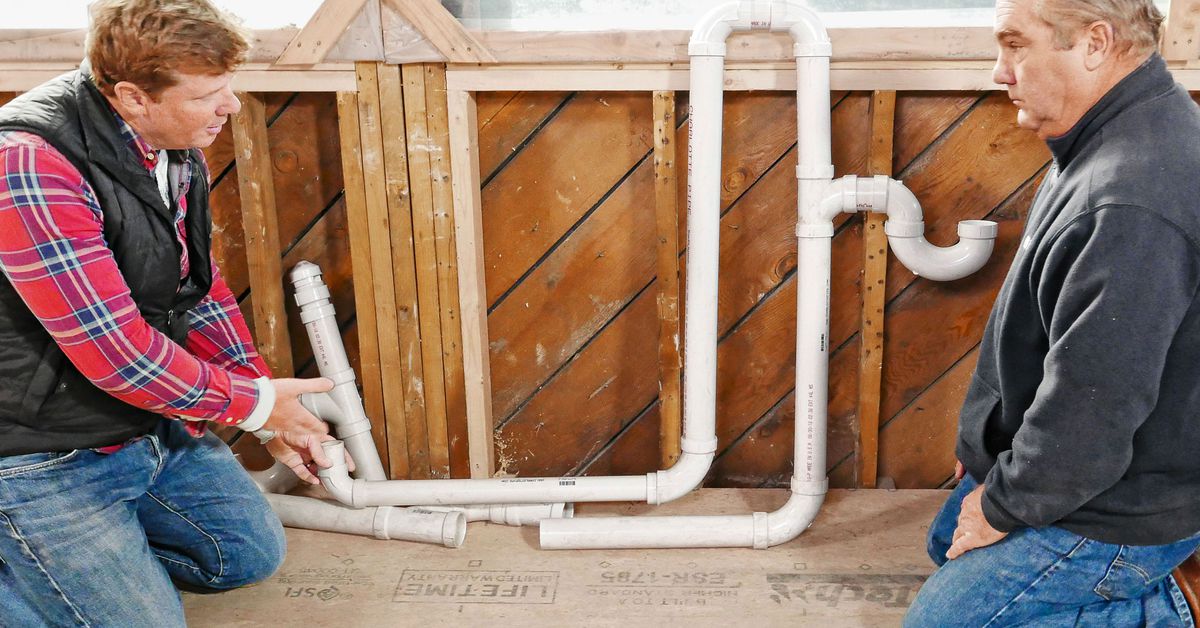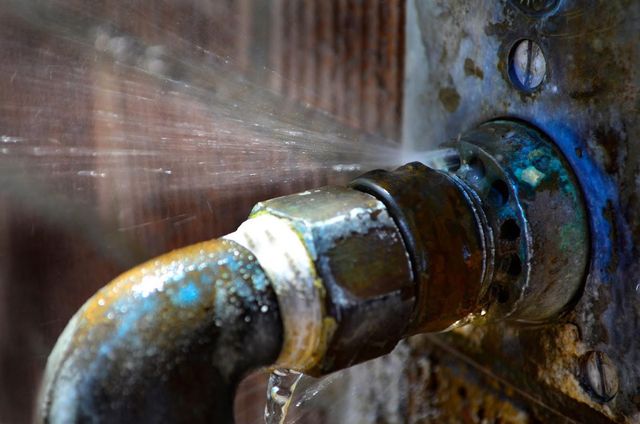What are your thoughts with regards to Why Do My Pipes Make Noises?

To identify loud plumbing, it is necessary to determine first whether the undesirable audios take place on the system's inlet side-in other words, when water is transformed on-or on the drain side. Sounds on the inlet side have varied causes: too much water stress, used valve and also faucet parts, improperly linked pumps or other home appliances, incorrectly placed pipeline fasteners, and plumbing runs containing way too many limited bends or other constraints. Sounds on the drain side generally come from poor place or, as with some inlet side sound, a layout having tight bends.
Hissing
Hissing sound that occurs when a tap is opened slightly normally signals too much water pressure. Consult your neighborhood public utility if you think this trouble; it will have the ability to tell you the water stress in your area as well as can mount a pressurereducing shutoff on the incoming water system pipeline if necessary.
Other Inlet Side Noises
Creaking, squealing, damaging, breaking, and also tapping typically are triggered by the growth or tightening of pipelines, normally copper ones providing hot water. The sounds occur as the pipes slide against loosened bolts or strike neighboring residence framing. You can typically determine the location of the issue if the pipes are subjected; just follow the sound when the pipelines are making sounds. More than likely you will certainly find a loose pipeline wall mount or an area where pipes exist so near to floor joists or various other framing items that they clatter versus them. Affixing foam pipeline insulation around the pipes at the point of contact must remedy the trouble. Make sure bands as well as hangers are protected as well as provide sufficient assistance. Where feasible, pipe fasteners must be affixed to enormous architectural components such as foundation walls rather than to framing; doing so minimizes the transmission of resonances from plumbing to surface areas that can intensify and also transfer them. If attaching fasteners to framing is unavoidable, wrap pipelines with insulation or various other resistant product where they contact bolts, as well as sandwich the ends of new bolts between rubber washing machines when mounting them.
Correcting plumbing runs that experience flow-restricting tight or numerous bends is a last resort that needs to be carried out only after consulting an experienced plumbing contractor. Unfortunately, this situation is relatively typical in older houses that may not have actually been developed with indoor plumbing or that have seen numerous remodels, particularly by amateurs.
Babbling or Shrieking
Intense chattering or shrilling that occurs when a shutoff or faucet is activated, and that generally vanishes when the installation is opened completely, signals loosened or defective inner parts. The option is to change the valve or faucet with a brand-new one.
Pumps and home appliances such as cleaning devices and also dishwashing machines can move motor noise to pipes if they are poorly connected. Connect such items to plumbing with plastic or rubber hoses-never stiff pipe-to isolate them.
Drain Noise
On the drain side of plumbing, the principal objectives are to eliminate surfaces that can be struck by falling or rushing water as well as to shield pipelines to contain unavoidable noises.
In brand-new construction, tubs, shower stalls, commodes, as well as wallmounted sinks and containers should be set on or against durable underlayments to minimize the transmission of sound via them. Water-saving toilets and also taps are less loud than traditional models; mount them instead of older kinds even if codes in your area still allow using older components.
Drainpipes that do not run up and down to the cellar or that branch into straight pipe runs supported at flooring joists or other framing existing particularly bothersome sound problems. Such pipelines are huge sufficient to radiate significant resonance; they additionally carry significant amounts of water, that makes the situation worse. In brand-new building and construction, specify cast-iron soil pipelines (the huge pipelines that drain bathrooms) if you can manage them. Their enormity has much of the noise made by water going through them. Additionally, stay clear of transmitting drainpipes in walls shared with bedrooms and rooms where people gather. Walls including drainpipes ought to be soundproofed as was explained earlier, making use of dual panels of sound-insulating fiberboard and wallboard. Pipelines themselves can be wrapped with unique fiberglass insulation created the function; such pipelines have an invulnerable vinyl skin (in some cases containing lead). Outcomes are not always adequate.
Thudding
Thudding noise, typically accompanied by shuddering pipelines, when a faucet or device valve is shut off is a problem called water hammer. The sound and vibration are brought on by the resounding wave of pressure in the water, which suddenly has no location to go. Often opening up a valve that releases water promptly right into a section of piping including a constraint, elbow, or tee installation can produce the exact same problem.
Water hammer can usually be treated by setting up installations called air chambers or shock absorbers in the plumbing to which the trouble valves or faucets are linked. These gadgets enable the shock wave developed by the halted flow of water to dissipate in the air they consist of, which (unlike water) is compressible.
Older plumbing systems might have brief upright sections of capped pipeline behind wall surfaces on tap competes the very same purpose; these can ultimately full of water, reducing or destroying their effectiveness. The cure is to drain the water supply entirely by shutting off the primary water shutoff as well as opening up all taps. After that open up the primary supply valve as well as close the faucets one by one, starting with the faucet nearest the valve and also finishing with the one farthest away.
Pipe Down! What to Do About Noisy Water Pipes
Banging
Does it sound like someone's hitting your pipes with a hammer every time you run water? The issue could be a phenomenon called water hammer, which happens when a water valve closes suddenly. You'll often hear it when your washing machine stops filling, for example. The momentum and pressure from the water flowing toward the valve create the shockwave that causes the banging noise when the valve closes suddenly. It might not seem like a big deal, but water hammer can cause damage to your pipes, including leaks and joint damage.
One way to ease water hammer is by installing water hammer arrestors. Your plumber can install them near major valves to help cushion the shock of the water when it suddenly stops or changes direction. You might also need to reduce the water pressure coming into your home with the pressure-reducing valve.
Gurgling
Gurgling sounds typically come from drainpipes. This sound happens when the water can't drain properly, usually when there's a clog in the water pipes. Drain clogs often happen due to hair, grease, soap scum or objects that fall down the drain. They can happen suddenly or build up slowly over time.
You can sometimes clear a clogged drainpipe with a plunger to help force the clog through the pipe. A plumbing snake or an auger can also help break up tough clogs. A common plumbing myth is that chemical drain cleaners are safe and effective, but they often don't work and contain harsh chemicals that can hurt you and your plumbing. If you can't remove the clog with a plunger or snake, it's best to call a plumber to help.
Rattling
Water travels through your pipes with lots of pressure, so the pipes are bound to move a little. Pipes should be secured well to keep them from moving too much when water runs through them. If they're not properly fastened or the fasteners come loose, you might hear them rattling when you run water.
Resecuring the pipes can cut down on the rattling noise and prevent damage to the joints of the water pipes. However, many pipes run behind walls where you can't easily access them. A plumber can help determine if loose fasteners are the cause of the rattling and resecure them if necessary.
Humming
If your pipes sound like they're humming, it's likely a water pressure issue. When the water pressure is high, it can cause the water pipes to vibrate and create a humming sound. High water pressure is more common if you have a well for your water, but it can happen with municipal water as well. High water pressure can damage your plumbing and cause leaks.
If you have a well, check the pressure to ensure it's below 55 pounds per square inch. A plumber can test the pressure for you and help adjust the issue if you're not sure how to do it yourself. If you're connected to the municipal water source, your home likely has a pressure-reducing valve near where the water enters your home. You can adjust the screw in the valve to decrease the pressure, but be careful not to lower it too much.
Squeaking
Squeaking or squealing is another common sound you'll hear in your water pipes. This often happens if small components within the plumbing, such as washers or aerators, become loose, dirty or damaged. When this is the cause, the squeaking sound is usually confined to a certain fixture or area of plumbing. Replaced or repairing the part should solve the noise.
If you can hear the squealing sound everywhere in your home, it could be an issue with water pressure. Buildup in the pipes narrows the space for the water, which can cause squealing as the water tries to squeeze through the pipes. Wear and tear on the plumbing system can also cause whistling or squeaking. These situations typically require a professional plumber to diagnose and repair.
https://www.homeserve.com/en-us/blog/home-improvement/water-pipes-making-noise/

Do you like reading about Why Do My Plumbing Pipes Make A Knocking Noise? Put a comment below. We'd be glad to find out your thoughts about this entry. We hope to see you back again in the future. Are you aware of somebody else who is intrigued by the subject? Feel free to promote it. Thank you for your time. Don't forget to pay a visit to our website back soon.
Learn More
Comments on “Understanding Plumbing Noises: A Guide To Resolving Them in Your Residence”